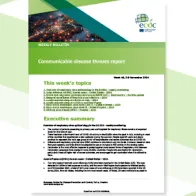Guidance on the provision of support for medically and socially vulnerable populations in EU/EEA countries and the United Kingdom during the COVID-19 pandemic
Public health guidance
The objective of this document is to provide guidance for civil society and non-governmental organisations (NGOs) as well as for national and regional authorities in the European Union and European Economic Area (EU/EEA) and the United Kingdom (UK), who are providing support for people who have medical and social vulnerabilities during the coronavirus disease (COVID-19) pandemic. Specifically, it aims to identify some of the major cross-cutting challenges, successes and lessons learned by these organisations during the period of stay-at-home and other measures from March-May 2020. It is hoped that the findings presented may be applicable to support service providers across the EU/EEA and the UK as the pandemic evolves, and in particular in the event of an upsurge in cases over the coming months that necessitates a subsequent return to stay-at-home measures or other restrictions in movement.
Executive Summary
Key messages
- The COVID-19 pandemic has had a huge and unprecedented impact on the EU/EEA and the UK, both in terms of morbidity and mortality, but also in social and economic terms.
- Some individuals are much more vulnerable than the rest of the population, whether to COVID-19 itself, insofar as they are at elevated risk of severe disease and death, or to the consequences of the public health measures that have been imposed in order to control the spread of the virus, which have exacerbated their already challenging life situations. These people could be described as medically or socially vulnerable, respectively.
- Many people have experienced both medical and social vulnerabilities during the COVID-19 pandemic, while others have faced a particularly extensive set of challenges due to their belonging to two or more recognised categories of social vulnerability. These challenges have included the need for targeted information, problems accessing services, de-prioritisation of routine services, stigma/discrimination, and legal as well as financial barriers.
- Civil society and other organisations have worked to provide essential services throughout the pandemic to support these people. An ECDC survey has identified a range of cross-cutting good practices that underpin the successes that have been achieved in spite of the considerable financial and logistical challenges faced. These include flexibility and an ability to adapt services to the emerging situation, thereby ensuring the continued provision of material and social support; creative use of online technologies; and a foundation for the work based on the principles of community engagement.
- National and regional authorities have facilitated civil society groups in many areas through provision of financial support; working to ensure good communication, collaboration and coordination with them; and facilitating a wider framework for action based on equity and human rights.
- However, coordination between civil society organisations and the authorities has not always been ideal. There have also been cases where the rights of vulnerable populations have not been upheld, as detailed in this document.
- The efforts of civil society support organisations over the course of the pandemic to date have been remarkable, but they may not be sustainable over the longer term, and they do not replace states’ obligations to ensure access to care and support for people on their territory.
- Financial and political support from national and regional authorities along with collaborative efforts to coordinate and streamline services may be essential if the support organisations are to survive and continue to serve the most vulnerable populations in the EU/EEA.
Publication file
Guidance on the provision of support for medically and socially vulnerable populations in EU/EEA countries and the United Kingdom during the COVID-19 pandemic
English (862.94 KB - PDF)Related content




Surveillance and monitoring

Share this page



